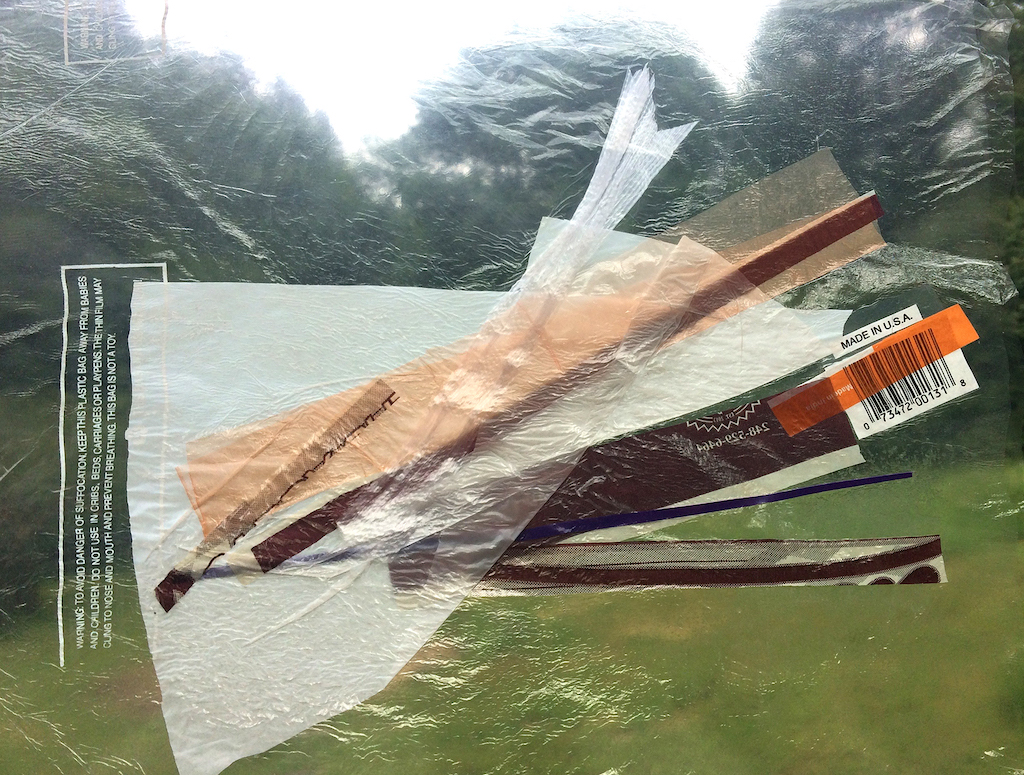An art installation by three MSU faculty members is helping bring awareness to the issues surrounding environmentally harmful plastics and our societal dependence on them.
The exhibition, Care. Not Convenience, which bridges art, design, science, and community engagement to foster dialogue on the role of plastic in our lives, will open at SCENE (Metrospace) November 8 from 6 to 8 p.m. and will remain up through December 20.
Funded by a Collaborative Arts and Design Research Grant from the College of Arts & Letters as well as the Department of Art, Art History, and Design (AAHD), the project is a collaboration between Kelly Salchow MacArthur, Associate Professor, and Jae Won Lee, Professor, both in AAHD, and Lissy Goralnik, Assistant Professor in the Department of Community Sustainability.
“This project is going to forever change how I think as a creator and designer,” Salchow MacArthur said. “I’ve been conscientious about the materials I use, but relying only on repurposed, recycled, and salvaged materials is really taking it to a whole new level.”

As artists and designers for the project, Salchow MacArthur and Lee used plastic bags, threads of various colors, and printed surfaces to create upcycled plastic installations for the exhibit, such as graphic design posters, panels of collaged plastic sheets, hanging plastic strips, crocheted plastic threads, plastic balls, and reusable grocery bags.
“The main goal overarching this project is to make people aware and change habits,” Salchow MacArthur said. “I think we’re in a crisis, and the more people who bring it to the forefront and talk about it, the more we can look at our daily habits and our activities and what we think is convenient or necessary regarding our plastic use.”
In order to maximize the project’s success, collaboration between the fields of art and science was necessary. “Coming up with collaborative, collective solutions toward plastic pollution requires artists to work with scientists, academics with community members, and the developed world with developing nations,” Lee said. “We need to work together to bring awareness to our environmental problems.”
I think we’re in a crisis, and the more people that bring that to the forefront and talk about it, the more we can look at our daily habits and our activities and what we think is convenient or necessary regarding our plastic use.
KELLY SALCHOW MACARTHUR, AAHD ASSOCIATE PROFESSOR
The WASTEnot project officially began in January 2019. While working with undergraduate research assistants, they collected plastic bags and vinyl banners from the campus community, which were used throughout the year as the main material for the artworks. An Eco-Craft Community Action Workshop at the MSU Broad Art Lab in March 2019 incorporated collaborative dialogue and plastic waste art-making, in partnership with the MSU Eli and Edythe Broad Art Museum and the MSU Surplus and Recycling Center.
Community events like the plastic bag collection were led by Goralnik, whose main role on the project was leading community engagement, writing narrative components, and project evaluation. Through her CSUS 301: Community Engagement for Sustainability class, Goralnik provided students with opportunities to organize community events centered around sustainability. These events included a bag collection event; the Eco-Craft Community Action Workshop; an Earth Day showing of the award-winning documentary Bag It! for campus and community audiences; and a plastic bag art and informal science education booth for 2,000 Kindergarten-6th grade students at the Department of Environmental Quality’s Earth Day celebration.
Including the community in events that supported the basis of the project was important in ensuring that the message of the project reached a wider audience. “Bridging art and science in an engaged community context is an opportunity to spark transformation, a way to see old problems with new eyes, and collectively envision a different future,” Goralnik said. “Engaging our communities in learning about the issues, encouraging them to envision a world they want to live in, empowering them to participate in place-based and systemic change is an important and necessary part of the process.”

During some of these events, Goralnik and students collected participant responses and ideas about plastic waste in their world. Some of this language is woven into the narrative text for the (SCENE) MetroSpace exhibit. Lee and Salchow MacArthur have contributed to the main components of the exhibition through the design of posters and exhibit panels, and the experimental and tedious art-making process throughout the year.
In June, Salchow MacArthur, Goralnik, and Lee attended a one-week collaborative retreat hosted by the Spring Creek Project for Ideas, Nature and the Written Word at Oregon State University. The retreat took place in a cabin tucked away in the Oregon Coastal Range. “This chance to co-vision and co-create over a series of days in a remote context where we were not distracted by technology or daily responsibilities, as well as the opportunity to get to know each other, our work habits, and our goals for the exhibit in the quiet moments, was transformative for the project,” Goralnik said.
After the Care. Not Convenience exhibit wraps up at (SCENE) Metrospace, the team plans to install work in the Kresge Art Center and Urban Planning and Landscape Architecture buildings, as well as look for other appropriate venues to host the exhibit. In the end, the plastic will be recycled.
Lee, Salchow MacArthur, and Goralnik wish to extend their gratitude to Jacquelynn Sullivan, AAHD Director of Galleries, for accommodating this exhibition at (SCENE) Metrospace, which is free and open to the public and located at 110 Charles Street in downtown East Lansing. See the (SCENE) Metrospace website for hours and more information.
Written by Annie Dubois


